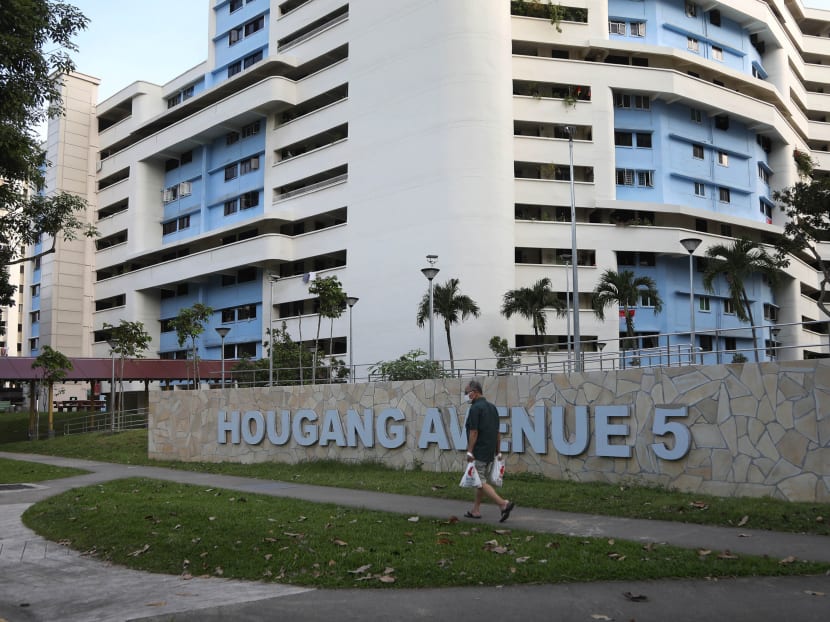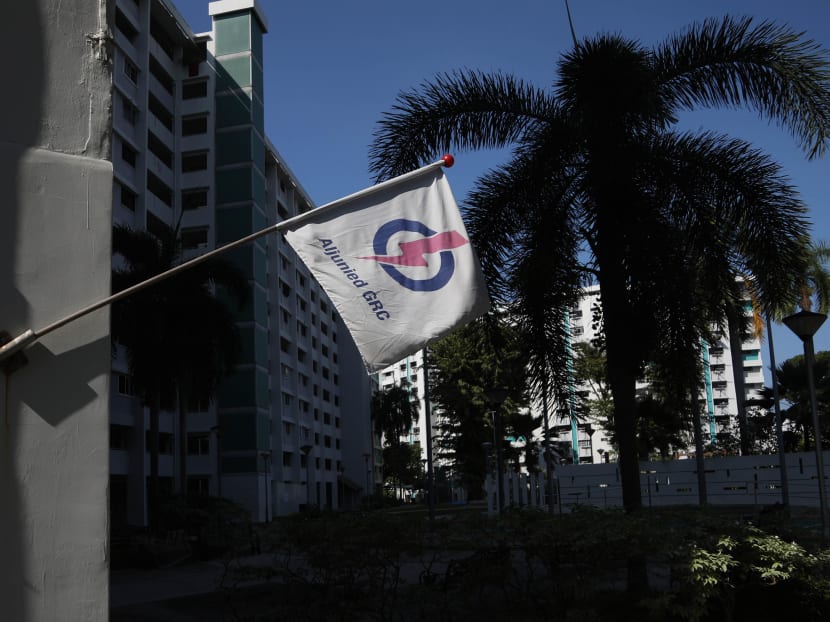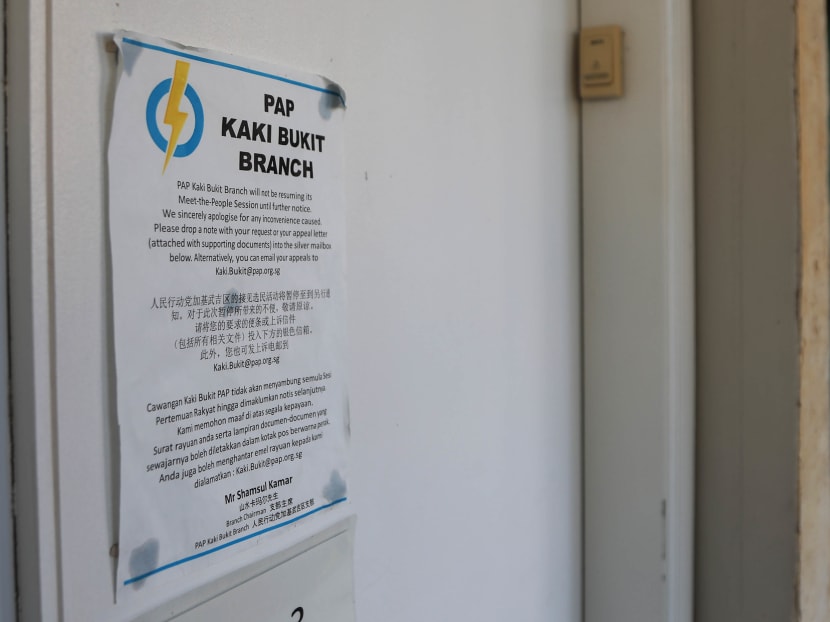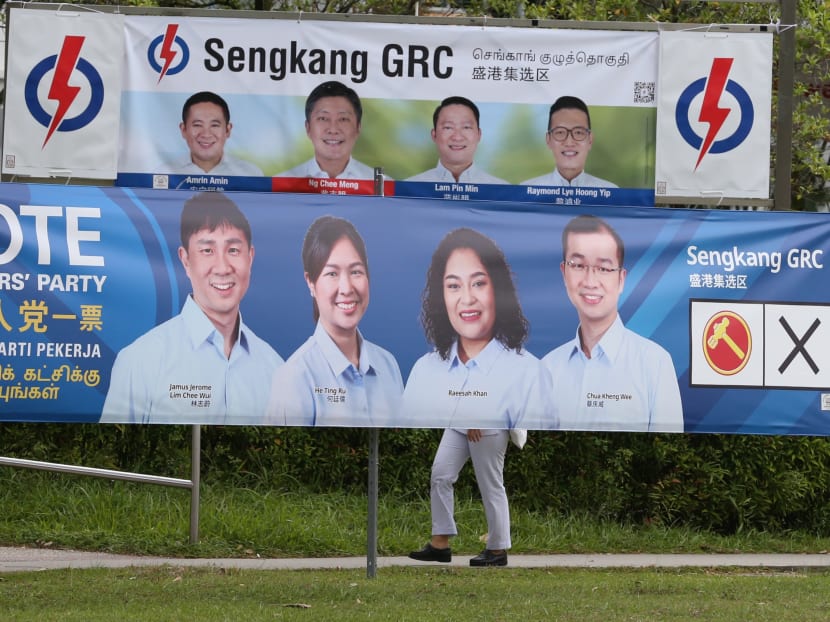The Big Read in short: Is PAP changing tactics in WP territory?
Each week, TODAY's long-running Big Read series delves into the trends and issues that matter. This week, we examine the People’s Action Party’s changing tack in the opposition wards. This is a shortened version of the full feature.

Speaking to TODAY, several PAP activists — who spoke on condition of anonymity — confirmed that in the past year, they have been urging residents living in the opposition wards to get in touch with their Workers’ Party MPs first.
Each week, TODAY's long-running Big Read series delves into the trends and issues that matter. This week, we examine the People’s Action Party’s changing tack in the opposition wards. This is a shortened version of the full feature, which can be found here.
- Since last year’s General Election, defeated PAP candidates have not restarted their version of meet-the-people sessions
- PAP activists in these opposition constituencies say they have been directing residents who approach them to the Workers’ Party instead
- Recent changes to CIPC funds could also portend a shake-up in grassroot politics, although defeated PAP candidates continue to serve as grassroot advisers
- Some analysts say the unprecedented moves may signal the party acknowledging calls for a fairer playing field
- Others believe that the PAP wants to dispel the notion that voters in opposition wards will have two parties serving them
SINGAPORE — Away from the public eye and amid the national focus on the Covid-19 pandemic, changes have been quietly afoot in how the ruling People’s Action Party (PAP) is going about its work to try and wrest back the opposition-controlled Sengkang GRC, Aljunied GRC and Hougang.
Since the General Election (GE) held in July last year, some political watchers have observed that its meet-the-people sessions in these wards have ceased entirely, even as elected MPs in all PAP and WP constituencies continued holding their sessions — be it physical or virtual — amid the pandemic.
Speaking to TODAY, several PAP activists — who spoke on condition of anonymity — confirmed that in the past year, they have been urging residents living in the opposition wards to get in touch with their Workers’ Party MPs first.
A party spokesperson said as much in response to TODAY’s queries: “Citizens are advised to approach the elected MP for their place of residence for help”
Still, some PAP activists in these wards were keen to stress that they remain focused on their mission.
In a joint response sent by Mr Victor Lye, who was part of the PAP’s team in Aljunied GRC in the 2020 GE, the PAP branch chairs in Aljunied GRC and Hougang said that their activists and volunteers “continue to support residents in these challenging times”.
“Through frank and personal contact built up over the years with our residents, we continue to (receive) feedback on issues close to all our hearts, as Singaporeans,” they added.
However, Mr Lye, who is the grassroots adviser for Aljunied GRC and was co-opted into the PAP’s top decision-making committee last year, did not respond when asked how he intercedes on behalf of residents who turn to him.
The PAP team in Sengkang did not comment and referred TODAY to the party’s headquarters when approached.
In April, the rules surrounding the Community Improvement Projects Committee (CIPC) funds, which has long been a bugbear for the WP, were also tweaked to allow town councils to apply for these government funds independently.
This means that the elected MPs in opposition wards will no longer have to seek access to these funds through the respective constituencies’ Citizens’ Consultative Committees (CCCs), which come under the People’s Association.
The jury is still out regarding how these community development funds will alter the ground politics in opposition wards, with several PAP activists saying the implications of such matters are still being discussed.
The WP declined comment for this article.

A CHANGE IN DIRECTION SIGNALLED BY PM LEE?
In 2011, after the PAP lost Aljunied GRC to the WP— the first time the ruling party had ever lost a GRC — it maintained its grip in the constituency through unofficial “meet-the-people sessions”, sometimes at neighbouring blocks to the WP’s official sessions, and a grassroots network of party activists.
Last year’s GE saw the PAP clinching 61.2 per cent of the popular vote. The result was 1.1 percentage points ahead of its poorest performance in GE2011, and below the 65 per cent mark that the party was aiming for, TODAY had earlier reported. The PAP also lost a second GRC — Sengkang — for the first time.
The PAP has said that the result could have been due to tactical voters who vote for the Opposition while expecting the PAP to still form the government of the day.
Speaking in the debate at the opening of the new Parliament last September, Prime Minister Lee Hsien Loong said these voters could end up with a freak result. Analysts noted that PM Lee and Leader of the Opposition Pritam Singh had sparred over whether such voters were “free riders” in the same debate.
Former PAP MP Inderjit Singh, who stepped down from politics in 2015, said PM Lee may have decided that residents cannot have the best of both worlds. “The PAP must have decided that if you vote for the opposition, you can only have one group serving you,” he said.
Nevertheless, party insiders spoke of the PAP’s own dilemma in giving more space for WP MPs to operate. The PAP does not want to be seen as though it is throwing in the towel in these wards, they said.
PAP activists pointed out that community bonds developed over the years matter more than party politics, as evident by the number of residents who still come to them for help.
Since the last GE, however, the change in approach has meant that grassroots leaders now refer residents in need to the WP MPs at their weekly meet-the-people sessions.
Activists added that they will respond to the residents’ call for help immediately only in desperate cases.
For most other matters, activists would emphasise that the sitting MPs are their first port-of-call. If the residents are unable to get the assistance they hope to get from their MPs, they can approach PAP’s volunteers thereafter.
Such a change places a greater onus on WP MPs to make their residents’ lives better than what the PAP had offered previously, they said. The reality is that residents have many channels to seek help, so the party does not truly “lose contact” with these residents.
“No one is left behind, no matter which way they are politically inclined,” said one activist.
APPROACH ALWAYS HOTLY DEBATED WITHIN PAP
The issue of what sort of engagement activities to carry out in opposition wards is always hotly debated within the PAP following every GE, said the party activists.
In the past, the party has always ended up deciding that it should continue its ground engagement efforts because it wants to continue winning hearts and minds in these opposition wards, activists said.
“If the PAP is going to help (the WP) each time by (having) grassroots volunteers do their best even after they lose the GRC, then how are residents going to compare and see if they are doing a better job or not?” said one activist serving within Aljunied GRC.
Political analyst Mustafa Izzuddin, from policy consultancy Solaris Strategies Singapore, said that the meet-the-people sessions are “incredibly useful and important” as a political mechanism because they give the party a sense of the ground sentiments.
But the PAP may well be looking at giving up such sessions in opposition wards as a new approach, since its previous strategy did not work, he said, adding that the arrangement could be a temporary one.
One veteran Hougang activist said: “We are only using Covid as an excuse. Definitely, we will go back and we won’t back down, because if we want to back down, we would have done so long ago.”

Speaking of his time as an MP in Ang Mo Kio GRC until 2015, Mr Inderjit Singh recalled that residents at such sessions expected him to do “everything” — from personal issues and complaints to improving the neighbourhood.
“When residents think of who they should seek help from, I think they should go to their MPs. And if the MPs can’t deliver, then that should help the residents decide in the future who they want to vote for,” said Mr Singh, an entrepreneur.
CIPC FUNDS: BONE OF CONTENTION NO MORE?
Another perennial bone of contention between opposition MPs and the Government is the funding from the Community Improvement Projects Committee (CIPC).
Some tens of millions in CIPC funds are issued by the Ministry of National Development (MND) each year to upgrade estates with facilities such as covered walkways, footpaths and playgrounds.
Unlike other forms of government grants which are disbursed directly to all town councils, CIPC funds had to be sought through the constituency’s Citizens’ Consultative Committee (CCC).
Previously, the CCCs, which come under the PA, vetted the applications from the ward’s sitting MPs. But the CCCs, too, came up with ideas for community improvement projects and decided which ones should be proposed to the CIPC for funding.
In PAP wards, the MPs are invariably appointed grassroots advisers, who endorse the CCC’s application for CIPC funds. In constituencies held by the Opposition, the grassroots advisers are often the defeated PAP candidates.
This has led opposition leaders to cry foul over the fairness of the process, charging that the mechanism serves to deprive opposition wards of funds to improve their estates.
In April, MND introduced a key change to the CIPC funding process: Town councils can now apply for funding directly from CIPC without approval from the CCCs.
The CIPC fund provides a 90 per cent subsidy for town improvement projects. Previously, the CCC that applied for the funding would be responsible for raising the remaining 10 per cent of the cost.
With the change, whichever entity applies for the CIPC funding will now be responsible for co-funding the project.
An MND spokesperson told TODAY that the change was in recognition that CCCs and town councils “both have roles in shaping town improvements”.
Under the new rules, CCCs can continue to propose projects to the CIPC for funding.
But since town councils are responsible for maintaining completed projects, the CCCs will have to seek the town council’s agreement to maintain the new projects before construction can begin, the MND spokesperson said.
The ministry’s shift in approach also appears to have addressed another sticking point that had been raised by the opposition.
Until recently, the CIPC had 12 members, comprising one senior civil servant and chaired by a PAP political officeholder. The rest of the members were all linked to the PAP as well, including party MPs and Mr Lye.
Now, the committee size has been cut from 12 to five members. Apart from PAP MP Sim Ann, who chairs the committee as Senior Minister of State for National Development, the rest are civil servants from MND, the Ministry of Finance, the Land Transport Authority and the Housing and Development Board.
Asked for the reason behind the change, the MND said it had “decided to focus its membership on representatives from relevant agencies”, in line with the changes to the funding process.
As discussions continue within the party branches and grassroots organisations on how the new rules will play out, it remains to be seen if the changes will bring an end to the longstanding debate over CIPC funds.
READING PAP’S STRATEGY
Political observers say that PAP’s moves to essentially cede some aspects of its work within opposition wards to the sitting MPs is a significant departure for the ruling party.
Meet-the-people sessions are a key part of the political structure and culture of the PAP, so it surprised him that the party is willing to forgo them. “That is a big, big deal,” said Dr Singh from the National University of Singapore, who authored the book “Is the People’s Action Party Here to Stay?”.
Mr Andrew Yeo, Asia practice lead for public policy advisory firm Global Counsel, said the idea of fairness resonates with a large segment of the population and applies not only to governance but to political practice.
“On the governance front, most would agree that the government has demonstrated that it is adept at passing both forward-looking and redistributive policies. Rather, it is the political style of the ruling party that has divided the public,” said Mr Yeo.
Dr Mustafa from Solaris Strategies agreed that there is a lingering sentiment among some people that they want the PAP to play fairer in opposition wards.

Mr Inderjit Singh, the former PAP MP, stressed that the changing ground politics in opposition wards does not mean the PAP is giving up its stake there.
While the PAP’s shift gives the impression that it is acknowledging calls for a fairer political playing field, its decisions are always tactical, observers said.
Associate Professor Eugene Tan, the Singapore Management University law don, believes that the moves are about blunting the WP’s election campaign slogan that if voters vote in the opposition, they will get two parties serving them.
“It is a decisive attempt to ensure that voters in an opposition ward will not have their cake and eat it,” he said.
Mr Inderjit Singh believes that the PAP’s new approach in opposition wards could be an effective political strategy if the opposition is “unable to deliver”.
But it also means that the strategy can also backfire for the PAP if the WP does a great job, he added.
WHAT’S UNCHANGED
Analysts and insiders noted that despite these changes, the PAP did not budge on appointing defeated candidates as grassroots advisers, which is another perennial complaint by opposition parties.
The PAP Government has long maintained that the PA does not play a political role, with its past leaders stating that grassroot advisers are appointed to carry out the mission of the government of the day and PA activities are not conducted for political purposes.
While the debate on the appointment of grassroots advisers often veers to why opposition MPs cannot be appointed to these positions, the reality is that the PA’s task is to support and explain government policies, said Mr Inderjit Singh.
“Imagine if the Government appoints opposition members as advisers. I do not think that they will go all out to defend government policies or implement them, because the Opposition are there to oppose,” said Mr Singh.
PAP’S DILEMMA
Observers also note that even as the PAP cedes more political space to the elected WP MPs, the party cannot be seen as abandoning residents.
Such an impression — that the PAP is no longer around — is precisely what the party wants to avoid but may inevitably stick in residents’ minds due its new approach in opposition constituencies, said analysts.
At the same time, some of the PAP activists’ actions on the ground in opposition wards do not seem to reflect the party’s official message that citizens should seek their elected MPs for assistance — leaving some political observers to wonder how to read the mixed signals.
For example, posters pinned on notice boards around the estates continue to urge residents to contact the losing PAP candidate for appeals and requests.
As grassroots advisers, the defeated candidates from the 2020 GE have also been actively working the ground, visiting Covid-19 testing venues and making house visits in the neighbourhood.
With the next GE not due by 2025, the PAP has plenty of time to finalise its strategy in the opposition wards.
And while there have been concrete changes, not least to the CIPC, political analysts believe the dust has yet to settle and the PAP is keeping the WP guessing.
As Dr Mustafa noted: ”It’s perhaps still early days.”










